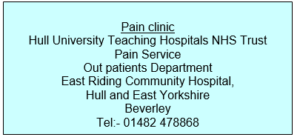- Reference Number: HEY-510/2023
- Departments: Pain Medicine, Pharmacy
- Last Updated: 1 March 2023
Introduction
You have been given this leaflet because you have been prescribed Amitriptyline. This leaflet has been produced to give you general information about your medication. Most of your questions should be answered by this leaflet. It is not intended to replace the discussion between you and your doctor, but may act as a starting point for discussion. If after reading it you have any concerns or require further explanation, please discuss this with a member of the healthcare team caring for you.
What is Amitriptyline and what is it used for?
Amitriptyline is used to treat many types of persistent pain. It is especially good for nerve pain, such as burning, shooting or stabbing pain and for pain that keeps you awake at night.
Amitriptyline belongs to the group of medicines called tricyclic antidepressants that are also used to treat depression. The dose of Amitriptyline needed for pain relief is usually lower than that prescribed for depression.
You may notice that information from the manufacturer does not mention pain; however Amitriptyline has been used to treat pain for many years. It is an unlicensed medication prescribed for the management of neuropathic pain.
Amitriptyline works by increasing the amount of specific nerve transmitters in the nervous system, reducing pain messages arriving in the brain.
How do I take Amitriptyline?
- The tablets should be swallowed whole with water.
- Amitriptyline may be taken on an empty or full stomach.
- You will be told how much to start taking and when to increase the dose. The table at the end of the leaflet will help you remember when to increase the dose.
- Do not take more than prescribed.
- It is best to take amitriptyline in the evening. Start by taking it 1 hour before going to bed. If you find that you feel drowsy the next morning, try taking it earlier in the evening.
How long will it take to work?
Every patient is different. You may notice some initial benefit within 2 weeks; however it may take up to 2 months for a full effect. Your doctor may need to increase the dose to get the maximum effect.
Amitriptyline does not work for everyone. If you do not feel any improvement in your pain, do not suddenly stop taking the tablets but speak to your doctor.
Are there side effects from taking Amitriptyline?
Most side effects are mild and it is expected that they tend to go away after a few doses.
Common side effects include drowsiness, dizziness, dry mouth, constipation and sweating. If you have these side effects and they are severe, contact your doctor or pharmacist for advice.
Less common side effects include fainting, trembling, irregular heartbeat, blurred vision or problems passing water. If any of these side effects occur, contact your doctor or pharmacist for advice.
Can I drink Alcohol?
Alcohol increases the sedative effects of Amitriptyline; it is best not to drink alcohol when you start taking it. Once settled on a steady dose, you may drink alcohol in moderation but it may make you more drowsy than normal.
What should I tell the doctor?
Tell the doctor if you:
- are allergic to any drugs or are taking any other medicines or herbal medicines
- are pregnant or breastfeeding, or if you are planning to become pregnant in the future
- have had a heart attack recently or have any heart problems
- have a history of epilepsy or fits
- have glaucoma
- have difficulty in passing water
- have thyroid disease
- have or have had a mental health problem
- are taking an anti-depressant medicine, especially one called a Monoamine oxidase inhibitor (MAOI)
REMEMBER
- Do not run out of amitriptyline
- Remember to ask for a repeat prescription before your tablets are finished.
What to do if you take too many tablets?
If you have taken too many tablets immediately seek medical advice from your GP or attend your local Hospital Emergency Department.
Can I drive?
Do not drive if Amitriptyline causes you to be drowsy. You must advise the DVLA if you are on medicines that may affect your driving.
Further information on Drug driving can be found at https://www.gov.uk/drug-driving-law
What do I do if I forget to take a regular dose?
If you forget to take a regular dose please take the following action:
- Take it as soon as you remember.
- If you only take one dose at bedtime and you miss the dose, do not take the medicine in the morning. Wait until the next night and skip the missed dose.
- Do not take two doses together.
What do I do if I want to stop taking Amitriptyline?
If you stop taking amitriptyline suddenly, you might experience withdrawal symptoms. Speak to your healthcare professional (doctor, nurse or pharmacist) who will be able to supervise a gradual reduction.
If you have any queries do not hesitate to contact the Pain Clinic:

The Pain Clinic is open Monday to Friday 9.00am – 4.00pm Outside the normal Pain Clinic hours, you can contact your own GP, your Out of Hours GP service or contact 111 for advice.
This leaflet was produced by the Centre for Pain Medicine, Hull University Teaching Hospitals NHS Trust and will be reviewed in March 2026
General Advice and Consent
Most of your questions should have been answered by this leaflet, but remember that this is only a starting point for discussion with the healthcare team.
Consent to treatment
Before any doctor, nurse or therapist examines or treats you, they must seek your consent or permission. In order to make a decision, you need to have information from health professionals about the treatment or investigation which is being offered to you. You should always ask them more questions if you do not understand or if you want more information.
The information you receive should be about your condition, the alternatives available to you, and whether it carries risks as well as the benefits. What is important is that your consent is genuine or valid. That means:
- you must be able to give your consent
- you must be given enough information to enable you to make a decision
- you must be acting under your own free will and not under the strong influence of another person
Information about you
We collect and use your information to provide you with care and treatment. As part of your care, information about you will be shared between members of a healthcare team, some of whom you may not meet. Your information may also be used to help train staff, to check the quality of our care, to manage and plan the health service, and to help with research. Wherever possible we use anonymous data.
We may pass on relevant information to other health organisations that provide you with care. All information is treated as strictly confidential and is not given to anyone who does not need it. If you have any concerns please ask your doctor, or the person caring for you.
Under the General Data Protection Regulation and the Data Protection Act 2018 we are responsible for maintaining the confidentiality of any information we hold about you. For further information visit the following page: Confidential Information about You.
If you or your carer needs information about your health and wellbeing and about your care and treatment in a different format, such as large print, braille or audio, due to disability, impairment or sensory loss, please advise a member of staff and this can be arranged.


